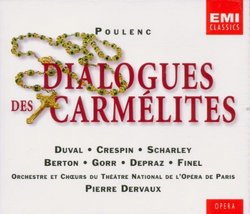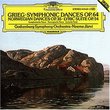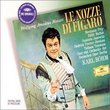| All Artists: Francis Poulenc, Pierre Dervaux, Denise Duval, Régine Crespin, Choeur et Orchestre du Théâtre National de l'Opéra de Paris, Liliane Berton, Paul Finel, Rita Gorr, Xavier Depraz, Janine Fourrier Denise Scharley, Louis Rialland, René Bianco, Jacques Mars Gisèle Desmoutiers Title: Poulenc - Dialogues des Carmélites / D. Duval ˇ Crespin ˇ Scharley ˇ Berton ˇ Gorr ˇ Depraz ˇ Ninel ˇ Fourrier ˇ Desmoutiers ˇ Opéra de Paris ˇ Dervaux Members Wishing: 0 Total Copies: 0 Label: Angel Records Original Release Date: 1/1/1958 Re-Release Date: 10/2/2001 Genre: Classical Styles: Opera & Classical Vocal, Historical Periods, Modern, 20th, & 21st Century Number of Discs: 2 SwapaCD Credits: 2 UPC: 724356713529 |
Search - Francis Poulenc, Pierre Dervaux, Denise Duval :: Poulenc - Dialogues des Carmélites / D. Duval ˇ Crespin ˇ Scharley ˇ Berton ˇ Gorr ˇ Depraz ˇ Ninel ˇ Fourrier ˇ Desmoutiers ˇ Opéra de Paris ˇ Dervaux
 | Francis Poulenc, Pierre Dervaux, Denise Duval Poulenc - Dialogues des Carmélites / D. Duval ˇ Crespin ˇ Scharley ˇ Berton ˇ Gorr ˇ Depraz ˇ Ninel ˇ Fourrier ˇ Desmoutiers ˇ Opéra de Paris ˇ Dervaux Genre: Classical
|
Larger Image |
CD DetailsSimilarly Requested CDs |
CD ReviewsFlawless singing and the most moving music you'll ever hear! Ygor | Brazil | 07/11/2004 (5 out of 5 stars) "I consider Dialogues des Carmélites the most likeable opera of the last fifty years. It was first performed at the La Scala in 1957 and since then all the main Opera Houses in the world have performed it and some of the greatest singers have sung it. It's not difficult to understand why. It has one of the most beautiful plots ever written for opera and the most touching music you'll ever hear. It's almost impossible not to be moved when you listen to it, particularly in Madama Lidoine's final aria "Mes filles, voilà que s'achève" and the final chorus "Salve Regina". It was a so successful opera that was recorded by EMI just one year after its world premiere. The cast is unsurpassable, and in this recording we do feel the drama, particularly the fear of death, which are the main purpose of the opera. Denise Duval has a truly French voice, and it's youthful, with kind of a tearful or afraid tone that helps us to understand Blanche's character. Then we have Régine Crespin's unbeliavable Madame Lidoine! She simply reaches perfection, and I would dare to say it's the most creamy, beautiful voice I've ever heard. Her technique allows her to sing everything as if it was simply talking to someone. Her imposing voice fits very well into Madame Lidoine's character. We also have wonderful contributions of Rita Gorr as Mère Marie and Liliane Berton as Soeur Constance, alongside with the shocking, intense interpretation of Denise Scharley as the dying Madame de Croissy.This is a French opera sung practically only by French singers and conducted by a great French conductor. The chorus is also French. Thus, we have not only flawless singing, but perfect style and diction. If either you want to know this wonderful opera or looks for a good recording, I recommend it as the most perfect version ever made!" One of the Mid-Twentieth Century's Greatest Operatic Works Timothy Kearney | Hull, MA United States | 05/07/2006 (5 out of 5 stars) "I became interested in Poulenc's DIALOGUES des CARMELITES long before I heard a note of the opera. I was twelve or thirteen at the time and was looking something up in an encyclopedia and I came across the entry for opera. Glossy photographs accompanied the entry and a stark black and white photograph of singers dressed as nuns lying prostrate on the floor piqued my curiosity. I'm sure it was a number of years later before I ever heard a note of the opera itself, but that image has remained with me for many years and it may be a reason why the opera has fascinated me over the years.
The story of the opera is about a Carmelite convent that was suppressed during the French Revolution and its nuns, who resisted the order of suppression were martyred. The story has become part of French culture and it caught the attention of Francois Poulenc, a composer who had moderate success during his lifetime but up to that time had not composed anything that would outlive him. DIALOGUES turned out to be his masterpiece. The powerful music, with a lush and fluid sound, a far cry form much of what was written for the operatic stage in the 1950's, is aided by a powerful libretto written by none other than Georges Bernanos, the great French writer who had the literary talent to write a wonderful story and the an understanding of Catholicism and a spirituality that can only come from a person of authentic faith. This recording was the first studio recording of the work and the cast includes some of the singers who performed in the work's premiere. Poulenc himself was also an advisor when the work was recorded, so perhaps this may be one of the few operatic recordings that we have that is true to the composer's intentions since the composer was involved in the recording. The cast includes one of opera's greatest voices, Regine Crespin as well as one of the best known mezzos of the French repertoire Rita Gorr. While the recording has been remastered, listeners will immediately notice it was first recorded in mono so it has an aged sound to it. Yet this should not be a deterrant because it has dramatic intensity. Very often I listen to opera while doing something else, and I will have to admit I can be working away as some of opera's most gory death scenes occur and barely notice. Yet whenever I listen DIALOGUES and hear the nuns sing "Salve Regina" and hear the chorus diminished one by one as the nuns are executed, and hear the guillotine (a percussion representation of the guillotine, of course) I always stop and pause. Even the total destruction of DIE GOTTERDAMMERUNG doesn't cause me to pause the way DIALOGUES can. If your purchasing this recording, you may also want to consider reading M. Owen Lee's commentary on this work in his volume A SEASON OF OPERA FROM ORPHEUS TO ARIADNE. In this entry Fr. Lee combines all that makes this a wonderful opera. " |

 Track Listings (29) - Disc #1
Track Listings (29) - Disc #1





